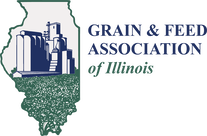|
Hello, my name is Justin Huff, and I am a senior at the University of Illinois in Urbana-Champaign majoring in Animal Science with a concentration in Pre-Veterinary Medicine. My career goal is to become a large animal veterinarian and provide services to food animals in the underserved rural America. My experiences at the University of Illinois sparked my interest in animal nutrition, and I was excited to be paired with The Maschhoff’s for my fall immersion tour. I have a strong connection with the company having served as an animal care technician while obtaining my Associate of Science degree from Kaskaskia, so I was very excited to return to the company in a new area.
I shadowed Mark Nagel for both days of my experience, and I really appreciated his time and the opportunity to learn about their feed mill. He began by giving me a tour of the mill and discussed how the Maschhoff’s pellet nearly 90% of all diets fed to their commercial herds. He explained to me the process of diet formulation and the addition of ingredients to make the desired ration for the various facilities they maintain. My favorite part of the tour was taking the elevator to the top of the mill and seeing the Maschhoff’s “penthouse view.” In addition to the tour of the facitilty, he discussed the importance of safety at the mill. In the past, they had an explosion at the feed mill site which taught them a valuable lesson about grain safety and the importance of maintaining a clean and safe environment. He explained that the mill remains very conscious of safety and has not had any serious accidents in a considerable amount of time. Another aspect of the mill that I experienced was the control room, where all the “magic” happens. Connie Kujawa allowed me to observe her methods for mixing feeds, running the pellet machine, and loading trucks all with a click of a button. On some occasions she had to unload some ingredients by hand but most of the systems are automated. In addition to controlling the machinery, she is also responsible for collecting samples from all shipments of feed that leave the facility. This sampling allows them to track any feed that leaves the facility if an accident were to occur. Connie also discussed the importance of being cognoscente of medicated feeds that leave the facility, as it is vital that antibiotics are not given to market hogs to prevent antibiotics from making it into our food system. My experience at The Maschhoff’s feed mill was very valuable, and I enjoyed learning about the technical aspect of the most important expense in swine production, feed. Comments are closed.
|
Grain & Feed Association of Illinois3521 Hollis Dr. Archives
April 2024
Categories |
|
Grain and Feed Association of Illinois. All Rights Reserved.
3521 Hollis Drive | Springfield, IL 62711 Phone: (217) 787-2417 | [email protected] | sitemap |

 RSS Feed
RSS Feed